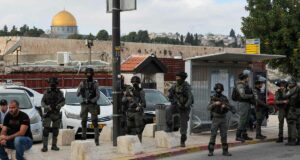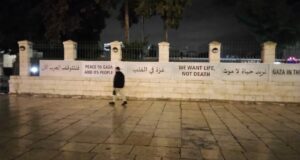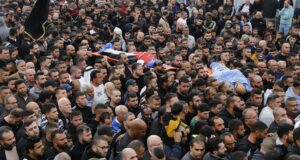International Solidarity Movement
16th May 2010
Al Ma’asara: ‘Culture is Resistance’

Reem Banna performing at Nakba Day observance in Al Ma'asara
The festival was opened with a series of speeches from representatives of Al Ma’asara and other villages in the Bethlehem region, and from Siham Barghouti, the Palestinian Minister of Culture. There was then a performance from the renowned Palestinian singer Reem Banna, who sang several songs to great acclaim from the crowd of perhaps 200 people.
Three tents erected alongside of the festival represented the villages destroyed and the people displaced in 1948, and again in 1967. After 62 years, despite ever increasing oppression and persecution, a huge rise in illegal Israeli settlements, the construction of the apartheid wall, and much more, Palestinians remain steadfast. They have not and will not abandon their homeland, and they will not forget the unique and special culture that they are rightly so proud of. This festival was a timely reminder of this.
Bil’in
The weekly demonstration against the apartheid wall in Bil’in also commemorated the 62nd anniversary of the Nakba, where 700,000 Palestinians were forced to flee their home and were made refugees. The demonstration was fronted by a huge wooden key, representing the non-negotiable demand for the right of return for refugees. There were also three men dressed as Handala, the popular cartoon character symbolising the children of the subsequent refugee camps. As the demonstration reached the wall it was met with huge amounts of tear gas and before long the army attempted to enter the village and one Palestinian journalist was arrested. However, the demonstration suddenly changed its focus as the hot tear gas canisters created several small fires which spread quickly across the land and amongst the olive trees. The demonstrators spent about half an hour trying to extinguish the fire with olive branches until a Palestinian fire engine turned up and the demo ended.
Hebron (al Khalil)

Demonstrators painted messages onto the miitary watchtower next to Shuhada Street
After an hour of speeches, chants and songs by the military base, the demonstration moved away, along a road that runs parallel to Shuhada Street. Settlers above, who were surrounded by soldiers and police at the time, threw rocks down onto the march. Fortunately, no-one was hurt. Some Palestinian children threw some of the rocks back, for which the soldiers attempted, unsuccessfully, to arrest them. Settlers then poured dirty water and spat upon the demonstrators as they walked along the road beneath them.
The settlements in Hebron are, like all settlements within the West Bank and East Jerusalem, illegal under international law. Palestinian residents of the Old City and the district of Tel Rumeida suffer severe restriction of movement, frequent harassment and occasional violence at the hands of both soldiers and settlers. Shuhada Street has been closed to Palestinians since 1994, forcing shops to close and residents to leave their homes.
Sheikh Jarrah
Around 50 people gathered Saturday to march from the American Embassy along Nablus Road to Sheikh Jarrah where police and soldiers had blocked off the street into the neighborhood, only letting settlers through. After a long speech the demonstration began to dissipate. A group of settlers held up an Israeli flag and a woman from the neighborhood proudly approached them with her daughter waving a Palestinian flag. The crowd followed with chants.
 International Solidarity Movement Nonviolence. Justice. Freedom.
International Solidarity Movement Nonviolence. Justice. Freedom.


